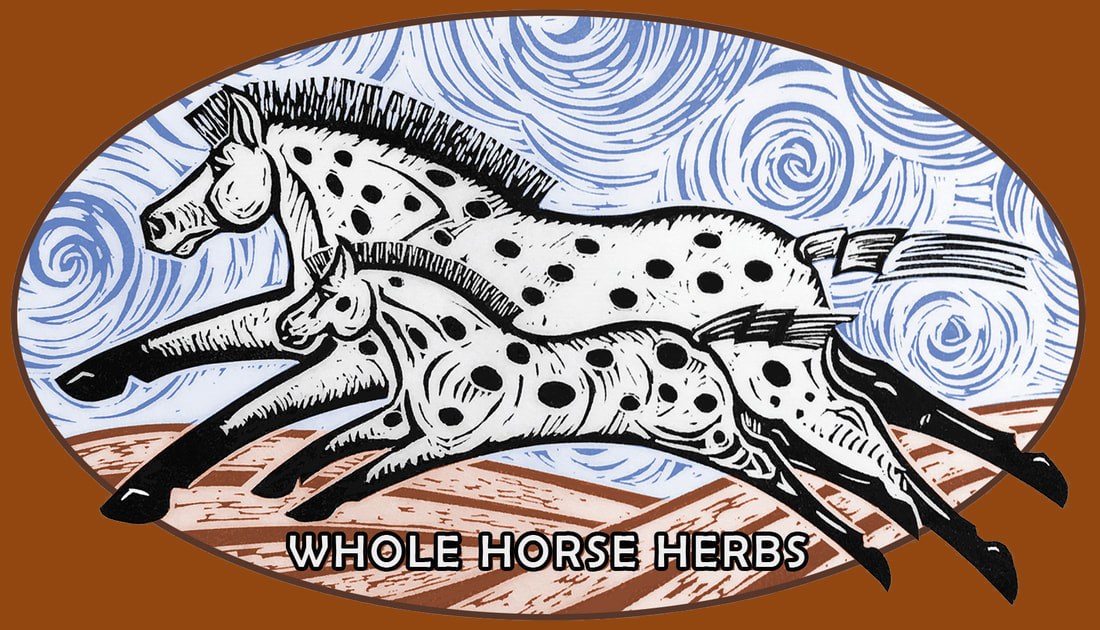Equine Immune Boosters
Prepare for Winter with Huang Qi
BY GLORIA GARLAND L.AC, DIPL. AC. & CH.
Autumn is a season of preparation. I like to use the last warm days of the year to prepare myself and my horses for the coming winter. In addition to filling the barn with hay, I begin an herbal immunity boosting program incorporating Astragalus or Huang qi as it is known in Chinese.
In Traditional Chinese Medicine, disease prevention begins with a protective layer around the exterior of the body called wei qi or defensive energy. Wei qiis the body's initial protection against external pathogens. A pathogen can be a bacterial, viral or toxic substance. From a Western perspective, wei qi can be compared to immunity. When wei qi is strong, pathogenic factors are deflected away from the body; when it is weak, a variety of infections can occur.
I like to think of wei qi as the fence protecting your home and yard. When the fence is tall and in good repair, it provides a solid barrier against intruders and unwanted visitors. If the gate is left open or fence boards are missing, the barrier is weakened, leaving the home vulnerable to all types of intruders.
There are many Chinese herbs that enhance the immune system and build wei qi, butHuang qi (Astragalus) is the most versatile.
Huang qi (Astragalus) looks something like a yellow tongue depressor. Modern research has identified several notable pharmacological effects confirming its historical use. Huang qi is an immunostimulant, increasing both specific and non-specific immunity. Huang qi also increases the number of white blood cells and has antibiotic properties against streptococcus and staphylococcus. Clinical studies have shown it to be effective in the prevention of colds and respiratory infections, especially helpful during the cold and flu season. It is also considered a hepatoprotective (liver-protecting) herb.
Huang qi is a safe herb for most horses and should be taken over a period of several months for maximum effectiveness. It can be administered in powder or decocted in a tea mixed with grain or sweet feed. For riders it can be taken in capsule from or as a tea. It has a mildly sweet flavor.
Chinese herbal supplements should be used properly and thoughtfully under the guidance of a licensed Chinese herbalist. Traditional Chinese Medicine (TCM), used properly, is an adjunctive therapy and, therefore, complementary to veterinary treatment.
DOWNLOAD A PRINTABLE PDF
In Traditional Chinese Medicine, disease prevention begins with a protective layer around the exterior of the body called wei qi or defensive energy. Wei qiis the body's initial protection against external pathogens. A pathogen can be a bacterial, viral or toxic substance. From a Western perspective, wei qi can be compared to immunity. When wei qi is strong, pathogenic factors are deflected away from the body; when it is weak, a variety of infections can occur.
I like to think of wei qi as the fence protecting your home and yard. When the fence is tall and in good repair, it provides a solid barrier against intruders and unwanted visitors. If the gate is left open or fence boards are missing, the barrier is weakened, leaving the home vulnerable to all types of intruders.
There are many Chinese herbs that enhance the immune system and build wei qi, butHuang qi (Astragalus) is the most versatile.
Huang qi (Astragalus) looks something like a yellow tongue depressor. Modern research has identified several notable pharmacological effects confirming its historical use. Huang qi is an immunostimulant, increasing both specific and non-specific immunity. Huang qi also increases the number of white blood cells and has antibiotic properties against streptococcus and staphylococcus. Clinical studies have shown it to be effective in the prevention of colds and respiratory infections, especially helpful during the cold and flu season. It is also considered a hepatoprotective (liver-protecting) herb.
Huang qi is a safe herb for most horses and should be taken over a period of several months for maximum effectiveness. It can be administered in powder or decocted in a tea mixed with grain or sweet feed. For riders it can be taken in capsule from or as a tea. It has a mildly sweet flavor.
Chinese herbal supplements should be used properly and thoughtfully under the guidance of a licensed Chinese herbalist. Traditional Chinese Medicine (TCM), used properly, is an adjunctive therapy and, therefore, complementary to veterinary treatment.
DOWNLOAD A PRINTABLE PDF


